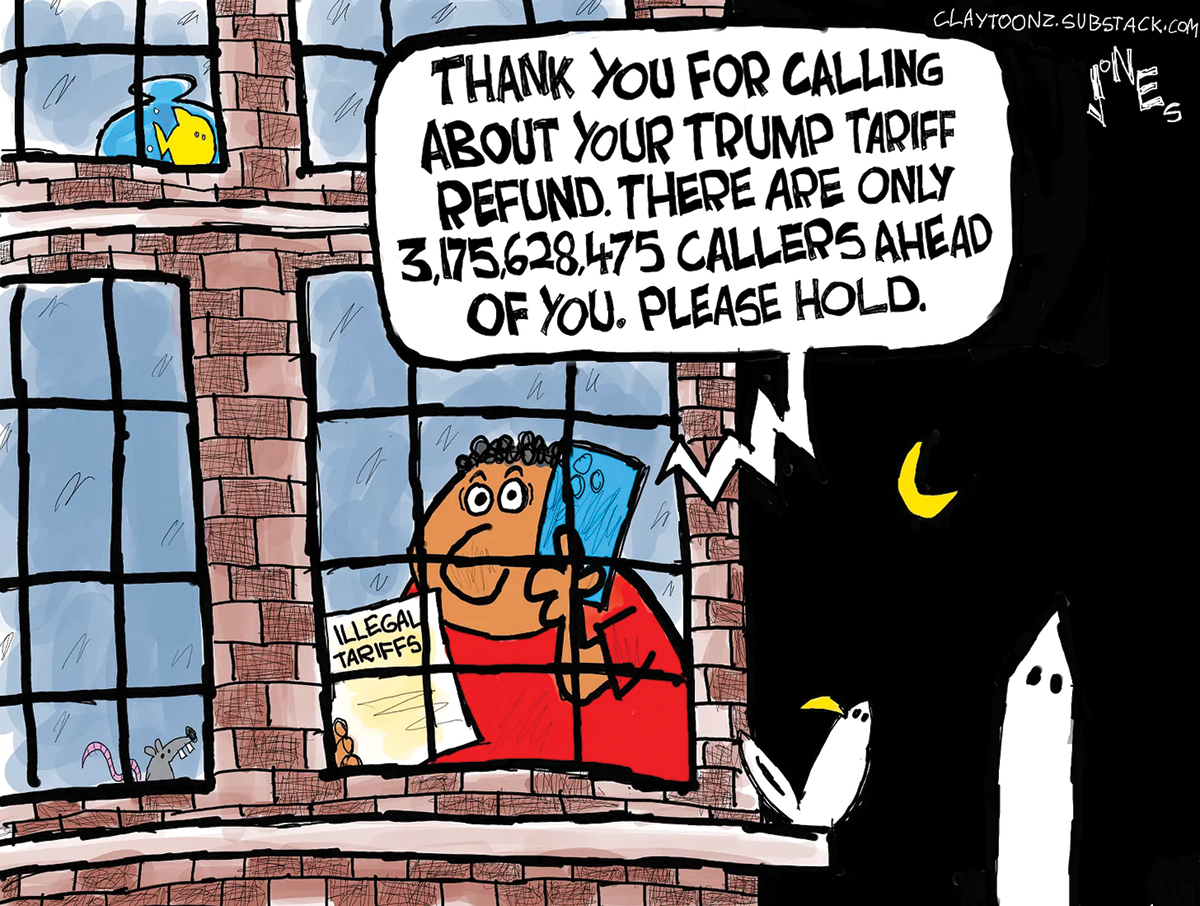The emperor's new trade war
Stop saying President Trump has started a "trade war." He hasn't. He's just playing make-believe.


A free daily email with the biggest news stories of the day – and the best features from TheWeek.com
You are now subscribed
Your newsletter sign-up was successful
Could someone refer me to the memo or press release in which the Heritage Foundation's takeover of American media, from Bloomberg to The New York Times to NPR, was officially announced?
It's easy to understand why libertarians would respond to President Trump's threat of a measly $60 billion in tariffs on Chinese imports with whinging and hysteria. This is what right-wingers do whenever anyone so much as sneezes anything that suggests an imposition upon the rights of financiers and businessmen. The good parts of the Affordable Care Act, cap and trade, and any tax increase proposed in the last half century have all been caricatured as a death sentence for Joe the Plumber.
What is everyone else's excuse? Why are we pretending that a "trade war," one of those phrases that appears in newspapers without ever being defined, is already immiserating pecan farmers and purveyors of — yes — chicken feet in Georgia, as I heard on NPR a few days ago? When Sen. Chuck Grassley (R-Iowa) moans about the consequences of so-far non-existent retaliatory Chinese measures in response to equally hypothetical American tariffs for, say, pork farmers, why do we pretend that he's talking about Pa and Ma Wilder rather than millionaire hog mavens whose unsustainable practices are among the most pressing ecological crises our country faces? The worst thing that could happen is that factory farming would take a hit. That would be a good thing.
The Week
Escape your echo chamber. Get the facts behind the news, plus analysis from multiple perspectives.

Sign up for The Week's Free Newsletters
From our morning news briefing to a weekly Good News Newsletter, get the best of The Week delivered directly to your inbox.
From our morning news briefing to a weekly Good News Newsletter, get the best of The Week delivered directly to your inbox.
What is all of this loose babble supposed to convince anyone of? Whenever any action is taken — requiring insurers to provide coverage to pregnant women, for instance, or increasing the minimum wage in our major cities to slightly above starvation levels — there will always be some businessman willing to claim that he is being unduly inconvenienced. The mere assertion that in a world in which we restrict the import of Chinese garbage onto these shores, the prices of certain things — tennis shoes at Dollar General or blazers at Banana Republic — might increase marginally is not an argument for or against such a course of action. The question must be decided on the actual merits.
The United States of America is a financialized economy in which roughly 1 percent of the population, in exchange for their high scores on certain meaningless tests and their perverse willingness to sit in ugly offices for 60 or 80 or 120 hours a week, enjoy enormous financial rewards. The rest of us bubble along on the current of their metrics-driven speculation, or the marketing they do on behalf of such activity. Everything about the way we produce and consume goods in this country must change. This will involve, among other things, altering our relationship with China and increasing the number of good-paying manufacturing jobs. The short-term consequences — for producers and consumers alike — of reversing long-term unemployment, wage stagnation, drug abuse, and environmental spoliation are irrelevant in comparison.
But all of this is academic. The meaningless tariff on steel and aluminum — one that, we are told, would not apply to Canada, far and away the largest provider of foreign steel to American corporations — has yet to take effect. No disinterested observer of this administration, least of all those of us who would favor such a policy, can afford to assume that it ever will. The same is true for the supposed levy on Chinese imports announced by the president last Thursday. At present the list, which no one has actually seen, of goods or businesses that will be exempt is open to revision from businessmen.
President Trump lives in a world of fantasy. For him tweeting about trade or infrastructure or immigration is not meaningfully different from realizing concrete policy goals. He doesn't care that we are never actually going to build the beautiful giant see-through wall along the Mexican border. He doesn't even seem to be aware of the fact that his administration has reversed course on Syria and Afghanistan. Why would it matter to him if American industrial policy remains more or less unchanged while he is in office? His willingness to play these childish games of make-believe is his own affair; the rest of us have a duty to live in the real world and evaluate what his White House does according to those standards.
A free daily email with the biggest news stories of the day – and the best features from TheWeek.com
If we are now a nation of free-trade fanatics, we should at least wait until a meaningful threat to the present of order of things appears before we start throwing a collective temper tantrum.
Matthew Walther is a national correspondent at The Week. His work has also appeared in First Things, The Spectator of London, The Catholic Herald, National Review, and other publications. He is currently writing a biography of the Rev. Montague Summers. He is also a Robert Novak Journalism Fellow.
-
 Political cartoons for February 23
Political cartoons for February 23Cartoons Monday’s political cartoons include tariff refunds, Epstein Island visits, and more
-
 Can Keir Starmer save the Chagos deal?
Can Keir Starmer save the Chagos deal?Today's Big Question Opponents confident they can scupper controversial agreement as PM faces a race against time to get it over the line
-
 China and the rise of the humanoid robots
China and the rise of the humanoid robotsThe Explainer The country’s ‘bustling’ robotics industry is dominating the global market, though experts are split on how concerned we should be
